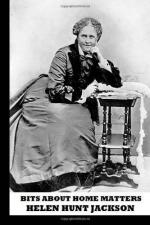in housekeeping was not overlooked. The groceries
of the different floors never got mixed, though how
this separateness of stores was accomplished will
for ever remain a mystery to me; but that it was successfully
accomplished the smallness of our bill was the best
of proof,—unless, indeed, as we were sometimes
almost afraid, we did now and then eat up Dr. A——’s
cheese, or drink the milk belonging to the B’s
below us. We were a party of four; our fare was
of the plain, substantial sort, but of sufficient
variety and abundance; and yet our living never cost
us, including rent, service, fires, and food, over
$60 a week. If we had chosen to practise closer
economies, we might have lived on less. Compare
for one instant the comfort of such an arrangement
as this, which really gave us every possible advantage
to be secured by housekeeping, and with almost none
of the trouble, with any boarding or lodging possible
in New York. We had two parlors and two bedrooms;
our meals served promptly and neatly, in our own parlor.
The same amount of room, and service, and such a table,
for four people, cannot be had in New York for less
than $150 or $200 a week; in fact, they cannot be
had in New York for any sum of money. The quiet
respectfulness of behavior and faithful interest in
work of English servants on English soil are not to
be found elsewhere. We afterward lived for some
weeks in another lodging-house in Great Malvern, Worcestershire,
at about the same price per week. This house was
even better than the London one in some respects.
The system was precisely the same; but the cooking
was almost faultless, and the table appointments were
more than satisfactory,—they were tasteful.
The china was a pleasure, and there were silver and
linen and glass which one would be glad to have in
one’s own home.
It may be asked, and not unnaturally, how does this
lodging-house system work for those who keep the houses?
Can it be possible that all this comfort and economy
for lodgers are compatible with profits for landlords?
I can judge only from the results in these two cases
which came under my own observation. In each
of these cases the family who kept the house lived
comfortably and pleasantly in their own apartment,
which was, in the London house, almost as good a suite
of rooms as any which they rented. They certainly
had far more apparent quiet, comfort, and privacy than
is commonly seen in the arrangements of the keepers
of average boarding-houses. In the Malvern house,
one whole floor, which was less pleasant than the
others, but still comfortable and well furnished, was
occupied by the family. There were three little
boys, under ten years of age, who had their nursery
governess, said lessons to her regularly, and were
led out decorously to walk by her at appointed seasons,
like all the rest of good little English boys in well-regulated
families; and yet the mother of these children came
to the door of our parlor each morning, with the respectful




